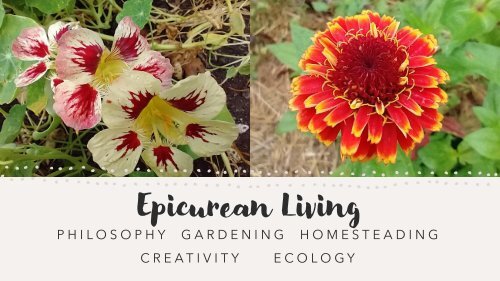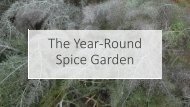Epicurean Living (Issue 2)
Modern Epicurean Philosophy, Gardening, Homesteading, Creativity, Ecology, and Sustainability
Modern Epicurean Philosophy, Gardening, Homesteading, Creativity, Ecology, and Sustainability
Create successful ePaper yourself
Turn your PDF publications into a flip-book with our unique Google optimized e-Paper software.
<strong>Epicurean</strong> <strong>Living</strong><br />
P H I L O S O P H Y G A R D E N I N G H O M E S T E A D I N G<br />
C R E A T I V I T Y<br />
E C O L O G Y
<strong>Epicurean</strong> life is about pleasure<br />
and strategic moderation.
How can we live <strong>Epicurean</strong> lives today?<br />
Put another way, how can we live pleasurable lives given<br />
the increasingly toxic consequences caused by modern<br />
living? There’s no perfect answer. But <strong>Epicurean</strong>ism is about<br />
making thoughtful life decisions by calculating the benefits,<br />
costs, and consequences of our choices. It requires us to<br />
navigate the tension between present wants and future<br />
possible negative outcomes.<br />
Imagining the long-term impact of our choices brings<br />
greater clarity. Think ahead to next week, month, year, or<br />
further into the future. Will the things you want now matter?<br />
Or are they just distractions moving you away from a pleasurable life as a whole?
The <strong>Epicurean</strong> Garden
The “Garden”<br />
What does a garden look like to you? Is it an abundant<br />
vegetable plot? A peaceful retreat? A boxwood lined love knot<br />
with a fountain? A romantic vista full of whimsy? Maybe it’s your<br />
grandma’s old oak and a long stand of pole beans.<br />
The word “garden” conjures different images for each of us.<br />
Yet, in the essentials, a garden is always a place where humans<br />
collaborate with nature on nature’s terms.<br />
That’s why gardens are terrific teachers of humility and<br />
gratitude. They remind us of our dependence on natural rhythms.<br />
And they encourage us to appreciate what a gift it is to be part of<br />
this amazingly complex and miraculous system of life.
Sustainable Gardening
What is Sustainable?<br />
The UN definition of sustainability is about meeting the needs of<br />
the present without compromising the ability of future generations to<br />
meet their own needs. In many parts of our lives, that kind of<br />
sustainability is difficult. In the garden though, we can go beyond<br />
sustainable and even improve our shared environment.<br />
No till practices and maximizing plant density can remove carbon<br />
from the atmosphere and put it back into the soil. A diverse<br />
population of pollinator and wildlife supporting plants can provide<br />
habitat for at risk species. Homegrown fruits and vegetables reduce<br />
the fossil fuel inputs and plastic packaging in our food supply.
How can<br />
you grow a<br />
sustainable<br />
garden?
Grow Organically<br />
Chemicals like herbicides, pesticides, and synthetic<br />
fertilizers, tilling, and monocultures degrade the quality of<br />
soil over time. They discourage diverse soil life and shortcircuit<br />
the relationships that plants would otherwise form<br />
with bacteria and fungi. Without those soil-based<br />
relationships, plants are more prone to insect attacks,<br />
fungal pathogens, and water stress.<br />
Organic gardening, by contrast, takes a little more effort<br />
to prepare the soil in advance. However, in time, soil<br />
improves, plants grow better, and costs go down. It’s also<br />
healthier for you when you don’t have to handle toxic<br />
products, spend time in a chemically controlled garden,<br />
or eat chemically treated food.
Grow Diversity and<br />
Support Wildlife
Grow Your Wildlife Population<br />
Beneficial insects, birds, and other life forms critical to<br />
ecosystem health are threatened by toxic chemicals, loss of<br />
habitat, climate change, and more. Humans are largely<br />
responsible for this devastation. But we don’t have to be. We<br />
can create wildlife support sanctuaries in our gardens.<br />
Grow diverse pollinator friendly flower plots. Leave garden<br />
debris out through winter to provide habitat. Offer shallow<br />
water plates for safe drinking. Eliminate pesticide use. Enjoy<br />
inviting more nature into your thriving garden!
Lettuce is beautiful while growing,<br />
delicious to eat, and stunning when<br />
flowering and going to seed.
Grow Your Own Food<br />
Gardens can be beautiful and productive without<br />
being farm-like.<br />
Sowing a “come and cut” leaf lettuce bed keeps your<br />
garden full, beautiful, and productive longer than<br />
growing heads of lettuce you harvest just once.<br />
Perennial plants like fruit trees, rhubarb, rosemary,<br />
mint, fennel, lavender, or Sichuan peppers are easy to<br />
grow. They offer long-standing beauty plus harvestable<br />
benefits with less work than many annuals.<br />
Think beyond the harvest when planning your<br />
plantings. Consider the pleasures of spending time in a<br />
garden that keeps on giving and is beautiful year-round.
Decorative perennial<br />
vegetables like<br />
asparagus can<br />
produce for decades.
The <strong>Epicurean</strong> Homestead
Homestead Life<br />
Homesteading is about turning your home<br />
into a place that provides for many of your<br />
needs. But that doesn’t mean it has to feel like a<br />
job or involve lots of hard work. That’s exactly<br />
what <strong>Epicurean</strong> homesteading shouldn’t be!<br />
Choose activities you enjoy. Create routines<br />
that help you relax. Opt for simple ways of<br />
doing things that require fewer tools and less<br />
maintenance in the long run.<br />
Spend more time enjoying your <strong>Epicurean</strong><br />
lifestyle than working on your homestead.
Many homesteaders aspire to raise livestock for meat to<br />
reduce costs and ensure those animals live well. This is a noble<br />
goal. However, raising enough animals to replace the quantity<br />
of meat most people eat today can result in a lot of hard work<br />
and a heavy heart from all that processing.<br />
Sustainable<br />
Meat Production<br />
Before you start, focus on eating smaller portions of meat,<br />
more pleasurably prepared. A single duck or chicken breast or<br />
steak -- sliced thin and served on a platter of risotto-- can feed<br />
a family. Or cuts can be spread out over multiple meals. Using<br />
less meat in more delicious and attractively presented ways<br />
cuts environmental and monetary costs while enhancing<br />
pleasure.<br />
After right-sizing meat consumption, then ordering your<br />
chicks “straight run” and processing roosters, keeping a<br />
breeding flock of ducks, or even hunting a deer or two can<br />
provide sufficient meat with less work.
Simplify Home Cooking<br />
Cooking can be a pain if you follow complicated<br />
recipes with long ingredient lists. But if you cook with<br />
what’s fresh from the garden, using spices and<br />
staples you always stock, it gets easy.<br />
Keep the steps simple by trimming out anything<br />
that seems too fussy. Save time by using durable,<br />
high-quality appliances like a mixer, blender, or food<br />
processor. Grind spices fresh in a coffee grinder for<br />
peak flavor and easy preparation.<br />
To enhance the dining experience, add garnish.<br />
Harvest fresh herbs as a plate decoration. Add color<br />
and increase flavor intensity with a splash of hot<br />
sauce or flavored oils and vinegars.
Bouquet Garni<br />
Bouquet garni is the French term used to describe a<br />
collection of culinary herbs tied in a bunch. They usually<br />
include parsley or leaf celery, thyme, and bay leaf plus<br />
other seasonally available herbs.<br />
Rosemary, basil, chervil, French or Mexican tarragon,<br />
oregano, winter or summer savory, sage, and common<br />
or garlic chives are some of my favorite additions.<br />
Lavender buds and fennel or anise flowers also make the<br />
mix potent and pretty. Inhaling the aroma and while<br />
arranging elegant bouquets is a pleasure.<br />
Drop the bunch in soups and sauces for flavor and<br />
fragrance. Remove before serving. Alternatively, put the<br />
bunch in a jar of water and harvest bits of various herbs<br />
as you need them over several days.
Simple ingredients, pleasantly prepared,<br />
make the most amazing meals.
How to Cook Duck<br />
Duck meat is lean like chicken, but rich and<br />
satisfying like steak. To roast duck, prick the skin all<br />
around. Surround or stuff with herbs and onions. Top<br />
with butter. Cook covered on 375°F, basting<br />
periodically with melted butter and wine, until tender.<br />
Alternatively, the breast can be salt-cured and<br />
sliced like prosciutto or seared and oven-finished like<br />
a strip steak. Cover legs and wings in butter and cook<br />
on 250°F until the meat falls off the bones. Then<br />
refrigerate for 1-3 days in the fat and juices and serve<br />
pieces of “confit” with a simple salad. Use the excess<br />
skin and bones to make stock in a pressure cooker.
Give biscuits<br />
and gravy an<br />
upgrade with<br />
a side salad.
Eat Greens<br />
Year-Round<br />
Corn salad or mâche is practically a weed. It<br />
grows in late fall, winter, and early spring.<br />
The leaves have a nutty, dense texture. It pairs<br />
well pair well with dried fruit like dates or figs. A<br />
few chunks of flavorful cheeses like chevre or<br />
Roquefort elevate it to a five-star salad.<br />
A drizzle of olive oil and balsamic plus rock salt<br />
are all the dressing this delicious cold season<br />
green need to make a great start to a meal.
Skip the chips and sauté up<br />
some fresh snow pea pods!
<strong>Epicurean</strong> Creativity
What is Creativity?<br />
Is creativity about generating ideas or innovative solutions?<br />
Making art? Designing spaces or objects? Writing? Photography?<br />
Being a musician? Cooking? Trying new things like growing exotic<br />
spices? It can be all of these things… or none of them.<br />
Creativity isn’t limited to a specific activity. It’s what happens<br />
when you leave the beaten path and trust yourself. It grows when<br />
you take a risk and start listening to your intuition.<br />
With practice creativity can flow through all areas of your life.
Ideate as a habit<br />
People journal to record events, work through<br />
emotions, examine philosophies, as a garden record,<br />
and more. But a journal is also a wonderful way to<br />
activate your creativity.<br />
Use your journal as a place to generate new ideas on<br />
a daily basis. Sit down with a cup of your favorite<br />
relaxing or uplifting beverage. Then let your<br />
imagination run wild. Write down any new idea that<br />
occurs to you -- no matter how whacky or unrealistic.<br />
Just be careful not to make this a “to do” or a<br />
shopping list. This is about letting your imagination<br />
occupy your active thinking time for a while.
Sustainable Creativity<br />
You can increase your creativity and sustainability at<br />
the same time. Just make it a habit to think creatively<br />
about the resources you use in your life.<br />
❖Repurpose items otherwise destined for the landfill.<br />
❖Give new life to objects you already have rather than<br />
buying something new.<br />
❖Plan projects around renewable resources available<br />
near where you live.<br />
❖Make some of the products you used to buy.<br />
❖Focus on durable not landfill-destined materials for<br />
your creative projects or decorative displays.
Change Your<br />
Perspective<br />
If you are a big picture person, dig into the details. ⧫ If<br />
you are a details person, take a broader view. ⧫ Take a<br />
risk if you are conservative. ⧫ Be more deliberate if you<br />
normally dive in. ⧫ Imagine living someone else’s life --<br />
realistically. ⧫ Visit new places or see old places in new<br />
light. ⧫ Let go of an old habit and start a new one. ⧫<br />
Get out of the algorithms that dictate what you see on<br />
social media and internet searches by reading used<br />
books, magazines, or journals that pre-date the<br />
internet. ⧫ Apologize and mean it even when you think<br />
you are right so you can let go of old grudges. ⧫<br />
Recognize past mistakes as the experiences that<br />
helped you become a more open-minded,<br />
understanding person. ⧫ Realize that our world is<br />
constantly evolving and change is inevitable.
Spending time in nature is one of the best ways to hone<br />
your ecological understanding. Turn off your technological<br />
devices. Focus on all the sensations and experiences<br />
happening around you.<br />
What does sun feel like? How does air taste and smell?<br />
What sounds draw your attention? What kind of nonhuman<br />
social interactions do you see taking place? How do<br />
the plants, animals, and ambient qualities interact?<br />
Don’t try to relate or find some deeper meaning. Just<br />
calmly observe the incredible variety of life forms and<br />
complexity of activity that takes place all around.<br />
Explore Nature<br />
One of the most profound lessons being in nature can<br />
teach is that it’s not about us. Humans are part of nature<br />
not the center of it. So much in nature happens all by itself<br />
with absolutely no human assistance. Yet, we do have the<br />
destructive powers to ruin it all if we aren’t careful.
When you can predict the negative consequences of<br />
your choices, it’s easier to do the right thing. However,<br />
most of the choices we make today have incalculable<br />
impacts. For example, climate change is caused by<br />
things like transportation, refrigeration, construction,<br />
fashion, and the use of other technologies. But how do<br />
we calculate the consequences of our personal usage?<br />
Or how do we know if giving them up will do any good?<br />
Think<br />
Ecologically<br />
The ecologically sound answer is easier than most<br />
people think. Don’t focus on the costs. Instead focus on<br />
the benefits. If something you want to do, or own, will<br />
genuinely make your life better or create memories<br />
you’ll treasure forever, go for it! But offset those<br />
meaningful costs by skipping stuff that’s really just filler<br />
and distraction.
Home Can Be Your<br />
Wellness Retreat<br />
People go to wellness spas to escape the toxicity of their<br />
normal lives. Why not use your home as a place of regular<br />
wellness and renewal instead?<br />
Avoid chemical pollution by using only a few products with<br />
short ingredient lists. Vinegar and mild soap can handle most<br />
cleaning tasks. Shampoo bars and moisturizes made from<br />
edible ingredients keep you radiant.⧫ Make herbal infused<br />
water to replace caloric beverages. ⧫ Sequester TVs and<br />
computers to a far end of your living space.⧫ Establish a<br />
“donate bin” next to your recyclables to clear clutter as you<br />
come across it. ⧫ Stretch or close your eyes and focus on<br />
your breathing whenever you feel hurried. ⧫ Detox yourself<br />
with daily salads and vegetable ferments.
Seasonal living -- the first strawberry/the last<br />
persimmon, spring flowers/fall leaves, first snow/last frost,<br />
long days/long nights – gives life a rich patina of contrast<br />
and interest. However, today seasonality plays less of a<br />
role in our modern lives. We buy seasonal foods shipped<br />
from the other hemisphere. Electric heating and cooling<br />
alter the climates in our home. Simulated daylight is the<br />
light we live by most often.<br />
Live Seasonally<br />
Today we must choose seasonal living to enjoy the kind<br />
of pleasure our ancestors experienced naturally. But it is<br />
so worth it! Anticipation is a huge part of the enjoyment<br />
and satisfaction of living well. Waiting to enjoy seasonal<br />
pleasures in their natural time increases the joy of having<br />
them. Open the windows, eat fresh and local, linger in<br />
waxing and waning natural light, and welcome seasonal<br />
rhythms into your life.
No one person or organization can salvage our suffering<br />
environment alone. If we each focus our energy and efforts on<br />
the ecological causes we feel passionately about, we can<br />
change the future starting now.<br />
Support an<br />
Ecological<br />
Cause<br />
Grow native plants for wildlife ⧫ Support migrating monarchs<br />
⧫ Advocate for the end of single use plastics ⧫ Plant trees<br />
⧫ Preserve national parks ⧫ Participate in citizen science<br />
⧫ Support local food producers or safer food and water<br />
⧫ Reduce carbon ⧫ Use clean energy ⧫ Create bird habitat<br />
⧫ Do environmental clean up ⧫ Do other ecological work.<br />
There’s no right answer about which issues need your<br />
attention. What really matters is that you focus on the<br />
environmental needs that resonate most with you. Then,<br />
channel your concerns for our ecological future into positive<br />
action now.
Sow the seeds of a<br />
beautiful future now!
Want More <strong>Epicurean</strong> Ideas?<br />
• Check out my books!<br />
• Visit me at Simplestead.com.<br />
• Follow me on Instagram<br />
@exploresimplestead.








